
International Workshop on Large Scale Graph Representation Learning and Applications
Successfully held in conjunction with IEEE ICDM 2018, November 17, 2018 in Singapore.
Thanks to all the 50+ speakers and attendees!
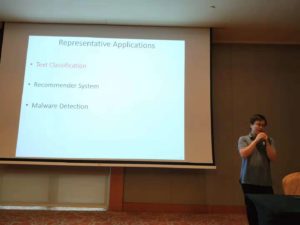
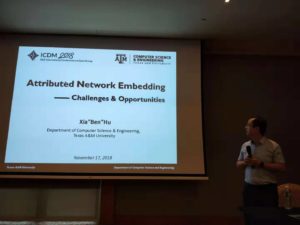
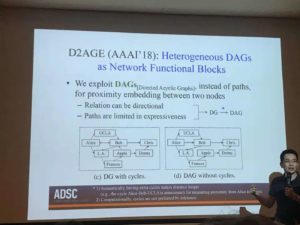
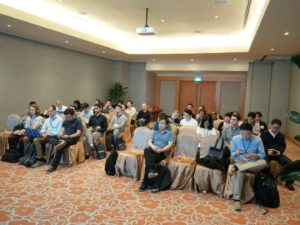
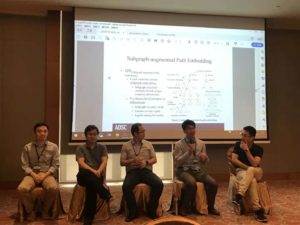
Introduction
Graph is a common representation for relational data. Typical graphs range from professional networks (e.g., LinkedIn), social networks (e.g., Facebook), bibliography networks (e.g., DBLP), to e-commerce networks (e.g., Taobao) and so on. Graph representation learning is a powerful technology to turn the graphs into useful insights. It enables many meaningful applications, such as link prediction, semantic proximity search, user profiling, friend recommendation, and social advertising. We propose to organize a workshop on large-scale graph representation learning and applications (GRLA), in association with The IEEE International Conference on Data Mining (ICDM) 2018. This workshop aims to: 1) contribute to the research development of graph representation learning, and 2) provide a communication platform for both research and industry communities to explore the useful application scenarios in practice.
Accepted Papers
- Y. Chu, C.Feng, C. Guo, Y. Wang, and J. Hwang, “Event2vec: Heterogeneous Hypergraph Embedding for Event Data”. Regular Paper.
- Z. Li, J. Huang, and D. Ding, “Learning Network Representations with Neighboring Affinity”. Regular Paper.
- I. Al-Hussien, E. Cambria, and N. Zhang, “Semantically Enhanced Models for Commonsense Knowledge Acquisition“. Regular Paper.
- L. Guo, S. Wang, and Y. Li, “Large Margin Graph Construction for Semi-Supervised Learning”. Short Paper.
- S. Ivanov, N. Durasov, and E. Burnaev, “Learning Node Embeddings for Influence Set Completion”. Short Paper.
- K. Nozawa, M. Kimura, and A. Kanemura, “Analyzing Centralities of Embedded Nodes”. Short Paper.
- S. Tsepa and M. Panov, “Constructing Graph Node Embeddings via Discrimination of Similarity Distributions”. Short Paper.
Schedule (2018/11/17)
- 8:00am – 8:45am Invited Talk
- Title: Automatic Information Fusion with Heterogeneous Information Networks.
- Speaker: Yangqiu Song (Hong Kong University of Science and Technology)
- 8:45am – 9:30am Invited Talk
- Title: Attributed Network Embedding.
- Speaker: Xia Hu (Texas A&M University)
- 9:30am – 10:00am Accepted Paper Spotlights
- Event2vec: Heterogeneous Hypergraph Embedding for Event Data (5min)
- Learning Network Representations with Neighboring Affinity (5min)
- Semantically Enhanced Models for Commonsense Knowledge Acquisition (5min)
- Large Margin Graph Construction for Semi-Supervised Learning (2min)
- Learning Node Embeddings for Influence Set Completion (2min)
- Analyzing Centralities of Embedded Nodes (2min)
- Constructing Graph Node Embeddings via Discrimination of Similarity Distributions (2min)
- 10:00am – 10:20am Coffee Break
- 10:20am – 11:05am IJCAI 2018 Early Career Spotlight Talk
- Title: Engineering Graph Features via Network Functional Blocks.
- Speaker: Vincent Zheng (ADSC, Singapore)
- 11:05am – 12:00pm Round Table Discussion
- Invited speakers, organizers and attendees
Important Dates
- Submission deadline: Aug 11, 2018, 23:59:59 (USA Eastern Standard Time)
- Due to receiving multiple separate requests, the organizing committee has carefully reviewed the situation and decided to extend the deadline.
- Acceptance notification: Sept 14, 2018, 23:59:59 (USA Eastern Standard Time)
- Due to conference paper transfer to our workshop on Sept 7, we decided to extend the acceptance notification by 7 days.
- Camera-ready deadline and copyright forms: Sept 22, 2018, 23:59:59 (USA Eastern Standard Time)
- Due to conference paper transfer to our workshop on Sept 7, we decided to extend the camera ready deadline by 7 days.
- Conference dates: November 17, 2018
Topics
The theme of this workshop focuses on graph representation learning and its large-scale applications. Topics of interest include, but not limited to:
- Graph Embedding Methods
- Graph embedding under various inputs, such as homogeneous vs. heterogeneous graphs, static vs. dynamic graphs, original vs. attributed graphs;
- Graph embedding under various outputs, such as node embedding, edge embedding, community embedding, subgraph embedding;
- Deep learning on graphs, such as graph auto-encoder, graph convolution, deep graph kernels;
- Probabilistic graph inference algorithms, especially when coupled with graph embedding (e.g., embedding propagation);
- Graph embedding with explainability;
- Integration of graph embedding models with structured prediction problems and probabilistic graphical models;
- Graph Construction and Processing Algorithms
- Graph construction from noisy machine logs, text and social data;
- Knowledge graph construction, representation and inference;
- Frequent subgraph pattern mining and instance matching;
- Graph sampling and summarization;
- Large-scale Graph-based Applications
- Network user profiling;
- Network user relation profiling;
- Network link prediction;
- Semantic proximity search;
- Network community detection and profiling;
- Network information diffusion and influence maximization;
- Graph-based recommendation;
- Implementation of Large-scale Graph Embedding Systems
- Graph databases;
- Distributed graph embedding and inference designs;
- Case studies of real-world applications;
Submission
- Submission
- Long paper: maximum eight (8) pages, in the IEEE 2-column format, including bibliography and appendices.
- Short paper: maximum four (4) pages, in the IEEE 2-column format, including bibliography and appendices.
- All accepted papers will be included in the IEEE ICDM 2018 Workshops Proceedings volume published by IEEE Computer Society Press, and will also be included in the IEEE Xplore Digital Library. Therefore, papers must not have been accepted for publication elsewhere or be under review for another workshop, conferences or journals.
- Online paper submission site is ICDM-GRLA2018. There is no separate site for short-paper and long-paper.
- Review process
- All submissions will be single-blind reviewed by the Program Committee on the basis of technical quality, relevance to scope of the conference, originality, significance, and clarity.
- All submissions should clearly present the author information including the names of the authors, the affiliations and the emails.
- Accepted papers
- Accepted papers will be included into workshop proceedings.
- At least one author of each accepted paper is required to register for the ICDM 2018 conference and present their work at the workshop.
Committee
Organizers:
- Vincent W. Zheng (Advanced Digital Sciences Center, Singapore)
- Wei Lu (Singapore University of Technology and Design, Singapore)
- Zhao Li (Alibaba Group, China)
Program Committee:
- Hongxia Yang (Alibaba Group, China)
- Jianzong Wang (Ping An Technology, China)
- Shaosheng Cao (Ant Financial, China)
- Yuan Fang (Singapore Management University, Singapore)
- Yuchen Li (Singapore Management University, Singapore)
- Zhou Zhao (Zhejiang University, China)
- Chuan Shi (Beijing Post and Telecommunications University, China)
- Erik Cambria (Nanyang Technological University, Singapore)
- Yu Lu (Beijing Normal University, China)
- Defu Lian (University of Electronic Science and Technology of China, China)
- Min Wu (A*STAR, Singapore)
- Xiang Ren (University of South California)
- Qiongkai Xu (Australian National University, Australia)
- Chuan-Ju Wang (Academia Sinica, Taiwan)
- Ming-Feng Tsai (National Chengchi Unviersity, Taiwan)
